1888-89 Glasgow Cup Shame
-
Controversial route to the Glasgow Cup Final
-
Willie Paul pursued by English professional clubs but stays with Thistle
-
Excellent result against the champions of England
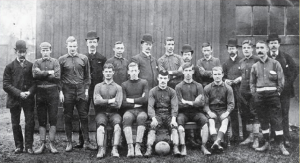
standing: Frank Burns (trainer), John McCorkindale (goalkeeper), David Hislop (forward), William Stirling (ex-player, Vice-President), Andrew Mackay (forward), John N. Boag (ex-player, President), William Proudfoot (half-back), Charles McQuarrie (ex-player, Treasurer), J. Kelly (forward), Andrew M. Smith (Honorary Secretary), John Drummond (forward), John Hendry (full-back), Jerry Suter (forward, Match Secretary)
sitting: Bob Robertson (half-back), William Hay (full-back), Andrew Johnston (forward), Thomas Campbell (full-back), George Ward (half-back)
would be leaving Partick Thistle. The Scottish Umpire reported the rumour that Paul would be playing regularly with a Lanarkshire club, while the player himself guested in a match for Clyde before the start of the season.
Rumours apart, by August Partick Thistle had registered all their players, including Willie Paul, for the season. Again, the Umpire was vociferous – the newspaper deplored the practice of contract signing by players and clubs. “Players should be free to play for whoever.”
There were new faces at Inchview – Hislop, Clark and William Proudfoot had joined from Partick Westburn after training over the summer with Partick Thistle, as had McBride of Moffat. John Stewart, who joined the club from Westburn the previous summer, was keen to try his luck at the professional game in England, and Newcastle were the tip for his next club.
The Exhibition Cup was a new tournament, constituted for the start of the season as a midweek competition – part of the grand International Exhibition being held at Kelvingrove. Games were played at the University Recreation Ground, on University Avenue between the Western Infirmary and the Univesity. Some reports suggested Partick Thistle were drawn against East Stirlingshire although no result was reported, while others suggest East Stirlingshire played and lost to Albion Rovers. Thistle went on to face and beat Airdrie 5-2 in the next round, before beating Kilbirnie 2-1 in the quarter final.
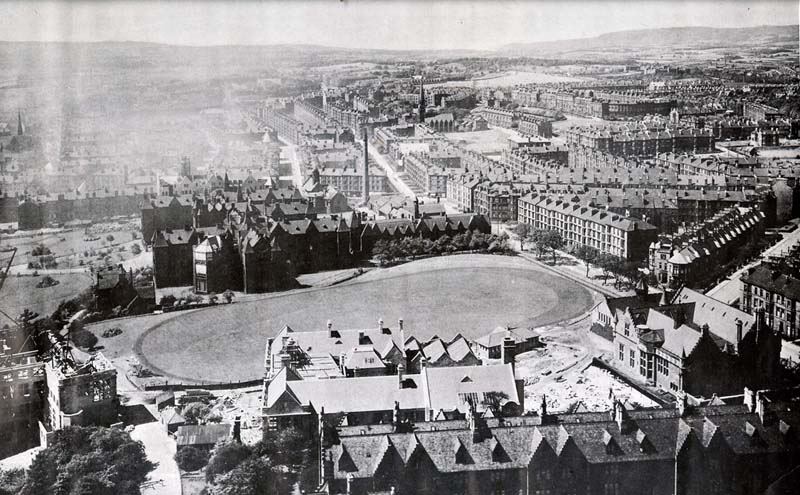
The University Recreation Ground, with the orginal Western Infirmary beyond, and University Avenue to the right.
Elsewhere, Thistle began the season with a 5-0 win over Shettleston, before losing 2-6 to Cowlairs at Gourlay Park, and 2-3 to Glasgow Cup winners Cambuslang.
Players were still coming and going at Inchview. John Stewart eventually left the club to join Hartlepool, while John Munro, who joined Partick Thistle from Westburn at the same time as Stewart, joined Sunderland.
The Exhibition Cup semi final saw the first ever meeting between Partick Thistle and Celtic, at the University Recreation Grounds. Thistle were reduced to ten men when Ferguson was injured, following which Celtic scored the only goal of the game, although the Thistle players protested that the ball did not pass between the posts. The Exhibition organisers arranged a fireworks display after the game ended.
Rangers were again the opponents in the Scottish Cup, and hopes were high after victory the previous season. Despite goals from debutant McBride and Andrew Johnston, quickly gaining a reputation as a fine winger, Rangers won 4-2.
An under-strength team lost 2-6 to Abercorn, who had Andrew Duff, the ex-Thistle goalkeeper playing, before the first round of the year’s Glasgow Cup competition was played. The opponents were Maryhill, and Thistle won the game 5-3. An excellent 4-2 win over Hibernian at Inchview was recorded before an invitation to travel to Ireland to celebrate the opening of a new stand was taken up.
Ulster were reckoned to be the best team in Ireland, but Thistle brushed them aside at Ballynafeigh, with a 12-1 win, reckoned by the players as the best performance for some time. The Belfast News reckoned “Partick Thistle are the best club side ever to have visited Belfast. The Partick Thistle men are a fine lot…play a nice gentlemanly game…a pleasant exception to some of the Scottish elevens who visit.”
The visitors are a fine athletic set of fellows, and play with a degree of ease and grace that our local football players might do well to imitate. .. The Scotchmen set to work with with a degree of energy and judgement which foretold an easy victory. Their combination and the science of their play were excellent. Whether in passing, shooting, running, or dodging they exhibited a coolness and certainty that indicated but too clearly how superior they were to their opponents. (Belfast Newsletter)
On their return from Belfast, Thistle faced 3rd Lanark at Cathkin Park. Although Thistle were 2-0 up at a point, Thirds came back and equalised with a disputed goal. Thistle protested, stating that the ball had gone over the bar and not under. The referee held firm, and the Partick Thistle players walked off the field causing the crowd to invade the park and surround the pavilion until the police arrived to disperse the troublemakers.
In England John Stewart had joined Sunderland Albion after a short spell with Hartlepool. Albion beat Shankhouse Black Watch 8-2 in the FA Cup Qualifying competition, and Shankhouse immediately protested that Stewart had become a professional when he left Inchview. The protest was thrown out and Sunderland continued in the tournament.
Some sort of revenge was achieved against Rangers for the Scottish Cup ex it, when they were beaten by Thistle at Inchview 2-0, although the score might have been more if the Rangers backs had not been on form.
As Ferguson left Inchview to join St Mirren, Willie Paul was reported as about to join Everton or West Bromwich. Bad feeling following the abandoned game at Cathkin was evident when a 3rd Lanark official said that his team would never play Partick Thistle again. This protest was short-lived, as the Glasgow Cup draw paired Thistle and Thirds at Cathkin again. The game was billed as a meeting of the two best centre forwards in Scotland – Willie Paul and Jimmy Oswald of Third Lanark.
Thistle recorded an excellent result against Vale of Leven, winning 4-3, before a disappointing defeat, at home to Battlefield. More distressing, though, was an injury to popular halfback Bob Robertson. The accident was so severe that rumours circulated that Robertson had died, and his brother, refereeing a match between Queen’s Park and Northern was told this. The rumour proved incorrect, although it seemed unlikely that Robertson would ever play again.
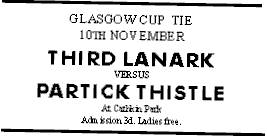 Further controversy followed the Glasgow Cup tie at Cathkin, after Partick Thistle arrived late with only ten players. Thistle started with just the ten men and won the game 2-1. Willie Paul appeared to get the better of his opposite number Oswald, scoring Thistle’s second goal. The Scottish Referee summed up: “Paul is speedier, has more dash, and shoots with greater accuracy. Oswald, while possessing all these qualities in degree, has a splendid knowledge of the passing, and can bind a set of forwards together as Paul has never done”.
Further controversy followed the Glasgow Cup tie at Cathkin, after Partick Thistle arrived late with only ten players. Thistle started with just the ten men and won the game 2-1. Willie Paul appeared to get the better of his opposite number Oswald, scoring Thistle’s second goal. The Scottish Referee summed up: “Paul is speedier, has more dash, and shoots with greater accuracy. Oswald, while possessing all these qualities in degree, has a splendid knowledge of the passing, and can bind a set of forwards together as Paul has never done”.
After the game Thirds protested that the late start made playing football in the semi-darkness impossible. The newspapers were divided on the answer. The Scottish Sport reported “The Third were fairly and squarely beaten”, although the Scottish Referee thought that Thirds “have right on their side.” The appeal was dismissed the following week by the Glasgow FA, despite the referee’s report that he felt it was too dark to play. When asked why he did not stop the game he stated that “he did not have the moral courage. He had been verbally abused earlier. Cathkin is not easy to get out of these days and he (Mr Park) cannot run as fast as he used to.”
Fierce winds in November caused a lot of damage at football grounds around the West of Scotland. At Inchview the hoardings around the ground were destroyed causing £40 of damage.
Clyde were the opponents in the semi final of the Glasgow Cup, at Barrowfield, and the game ended in a 1-1 draw (“The ground was like a quagmire, and although the players were as black as niggers with mud, they played with a determination that was most astonishing,” said the Scottish Referee), before a replay at Inchview saw Thistle win 1-0 to earn a place in the final against Queen’s Park. Special trams were run from Bridgeton to Inchview, such was the interest in the games. 3rd Lanark re-protested, shortly before the replayed semi, but the Glasgow FA refused to re-open the protest.
Shortly before the semi final was replayed, Thistle managed a fine away win at Clune Park, beating Port Glasgow Athletic 6-0.
At an SFA meeting almost a month after the original match, 3rd Lanark appealed again about the Glasgow Cup match. The SFA refused to interfere with the Glasgow Association’s business. However, at the same meeting Abercorn protested about their match against 3rd Lanark in the Scottish Cup ending in darkness. The Abercorn protest was upheld.
At the start of December, Partick Thistle’s half-yearly meeting was held at President John Boag’s new hall, the Orange Hall in Rosevale Street. Treasurer McQuarrie reported that the club had a healthy credit balance.
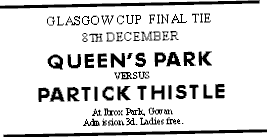 Everyone involved with Partick Thistle had been desperate for the chance to prove themselves in a high-profile game, to show the club as truly one of the top clubs in the country. It was fitting that Queen’s Park should be the opponents in the Glasgow Cup Final, the perennial barrier to the club being accepted as worthy opponents for all. The players were said to have been undergoing special training for the match during the week before the final, and all Partick hoped this would make the difference. “The demon of disgust must have enthralled Partick Thistle’s supporters. It was perhaps the most inane and namby-pamby football spectacle…even the Thistle’s supporters jeered them…the Partick Thistle were no more the Partick Thistle that beat 3rd Lanark and Clyde as I am. They seemed to lose their heads right away and they played with a listless and aimless way throughout.” (Scottish Referee). Willie Paul was criticised for not being enough of a team player. Had he been a wide player, the Referee suggested, this would be fine, but a centre forward needs to be more of a team player and involve his team mates. The final score ended 8-0 to Queen’s Park.
Everyone involved with Partick Thistle had been desperate for the chance to prove themselves in a high-profile game, to show the club as truly one of the top clubs in the country. It was fitting that Queen’s Park should be the opponents in the Glasgow Cup Final, the perennial barrier to the club being accepted as worthy opponents for all. The players were said to have been undergoing special training for the match during the week before the final, and all Partick hoped this would make the difference. “The demon of disgust must have enthralled Partick Thistle’s supporters. It was perhaps the most inane and namby-pamby football spectacle…even the Thistle’s supporters jeered them…the Partick Thistle were no more the Partick Thistle that beat 3rd Lanark and Clyde as I am. They seemed to lose their heads right away and they played with a listless and aimless way throughout.” (Scottish Referee). Willie Paul was criticised for not being enough of a team player. Had he been a wide player, the Referee suggested, this would be fine, but a centre forward needs to be more of a team player and involve his team mates. The final score ended 8-0 to Queen’s Park.
The Scottish Sport analysed more in depth
“Were one to go solely on the form displayed last Saturday in the final battle for the possession of that handsome trophy, the Glasgow Cup, played at Ibrox Park in presence of six thousand spectators, the only conclusion possible is that the Partick Thistle is a very much overrated team. We all went down to Rangers’ pretty ground expecting to see one of those soul-stirring contests usually associated with final ties, when what was supposed to be the two best clubs meet to fight for the local championship. We were treated instead to a very lame spectacle. The Partick team gave no indications that they were possessed of more than second-class ability, and at no period in the game, bar the first five minutes and for a short while in the middle of the second half, had they ever a look in. Of course no one will assert that the Thistle representatives showed their true form…
The Thistle played a hard game, it is true, but their efforts were feeble. In their movements they are, with one or two exceptions, most lethargic, being very slow on the ball. Their tendency to dally with it at critical moments must have been exasperating to their supporters. One great blemish, too, was the disposition to dribble displayed by their half backs, while their forwards were anxiously waiting for the ball to be sent on to them. This dribbling proved an expensive affair, as time after time their halves had the ball taken from them. I have it from an enthusiastic supporter of the Partick club that he never saw the team play worse. His opinion was that they were beaten before they stepped on to the field – that fear, which takes possession of many clubs when facing Queen’s Park, having more to do with their collapse than an inability to play good football. There may be something in this. The Queen’s Park has still a terror for some people. Many of the people who formed the Partick Thistle team had never before stood up against our great leading club and may be excused if they gave way to a nervous fear begotten of the great task before them…
Their backs don’t seem to put force into their kick. Their half-backs, save Ward, did little to stop the Queen’s Park forwards, and frequently entered into a dribbling competition, in which they were worsted. McCorkindale their goalkeeper, gave no indication that he is in the possession of the remarkable cleverness claimed for him by supporters of the club. Bennett seems smart, but he clearly wants experience against first class teams. He played too much single-handed. Johnston worked hard, but for the rest little can be said.”
Disappointment gripped Inchview after the poor final display, and Thistle followed it up with a home defeat to Cowlairs 2-0, before redeeming themselves with a 3-1 away win over Albion Rovers.
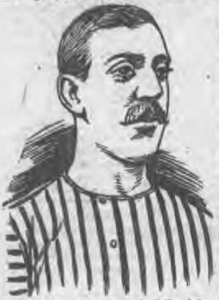
William Hay
William Hay joined the club from Maryhill and played regularly at left back for the rest of the season. He later joined Rangers and then moved to London where he played occasionally for Millwall and regularly for London Caledonians, an amateur team who selected mainly Scots.
In the previous few years Partick Thistle had recorded impressive results against English teams, both in the English Cup, and during New Year tour matches. This year, though, heavy defeats at the hands of Bolton (1-6) at Pike’s Lane, and Accrington (0-10) did nothing to lift spirits amongst the players. A joint social “smoker” at the Douglas Hotel in Manchester, along with the Rangers players also on tour in Lancashire, brought in the New Year, and this may have had something to do with the poor score against Accrington the following day, although an injury to John McCorkindale meant he missed the second half, and this wouldn’t have helped. Rangers also lost heavily in their game. Bob Robertson showed that he had fully recovered from his earlier injury by travelling with the playing party.
During the visit Willie Paul received his customary offers of moves to English clubs. These clubs were obviously unimpressed with the description in the Scottish Referee of the player after the Cup Final: “It is a pity that Willie Paul was not trained as a wing player. He is by nature an individual player and did no passing of note.”
Thistle returned and were unable to do anything about the erratic run of results – a fine 4-2 win over Vale of Leven at home was followed by a 4-2 defeat by Northern, a 2-1 win over Battlefield, a 7-6 win over Albion Rovers, and a 1-0 defeat by Airdrie.
 Bob Robertson continued to show his abilities at representative level, turning out for Glasgow against Sheffield in mid January, before being taken off injured in the above-mentioned game against Albion Rovers. The score was 7-2 when Robertson left the field – the game ended 7-6.
Bob Robertson continued to show his abilities at representative level, turning out for Glasgow against Sheffield in mid January, before being taken off injured in the above-mentioned game against Albion Rovers. The score was 7-2 when Robertson left the field – the game ended 7-6.
3rd Lanark, who were involved in two protests against results against Partick Thistle earlier in the season, were involved in their fourth protest of the season, and were again unsuccessful. The press reported that there were two “city clubs who have not received return matches against 3rd Lanark. In one case their patience is about to be exhausted.” This may have been a reference to Partick Thistle, who had not received a return match at Inchview in return for their visit to Cathkin earlier in the season. It was customary for clubs to play return matches to allow the home sides to retain admission money.
Willie Paul remained a key player at Inchview, but the press were unable to make up their minds about him. Scottish Sport, following an international trial match, felt he showed “he has few superiors at centre”, while the Scottish Referee took a differing point of view:
When Mr Paul emerged from the obscurity of Partick Elm and took his place in the Partick Thistle the critics recognised him as a gem and cracked him up accordingly. The Paul of those days, however, is not the Paul of the present time. He has not blossomed into the football god which many expected him to become, yet in many respects he is a great player. He is a brilliant individual dribbler and had he a knowledge of combination commensurate with his dodging powers he would be our centre forward par excellence.
Paul, although one of the most brilliant individual forwards we have when he likes, has a poor idea of combination. On Saturday I head him call again and again for the ball, and when he got it he went off on his own hook only to find that the men against him were not to be beaten by individual play.
Despite these concerns, the player was selected to play for Scotland against Wales – a 0-0 draw in Wrexham.
In February Willie Paul and Andrew Johnston played for Glasgow against Edinburgh.
A 4-2 win over Rangers at Ibrox, exorcising the demons of the Glasgow Cup Final at the same venue, seemed to be a turning point in the season. Willie Paul and Andrew Johnston scored against Rangers, and both went on to play for Glasgow against Edinburgh the next week. A 2-0 win over St Bernards was recorded while Johnston and Paul were missing.
In March a 3-0 win over Cambuslang was recorded before Renton was visited (1-3 defeat), Morton hosted (2-2), and Motherwell beaten 3-2 at Dalziel Park.
At Hamilton Crescent an exhibition of baseball was arranged, which attracted around 2000 spectators. The game between All America and Chicago didn’t hold the spectators interest and by the end of the game most had left the ground, having watched the game in what was reported as bored silence. The Evening Citizen suggested that it was a “just a counterpart of rounders.”
Two Dykebar players had been selected to play for the Renfrewshire FA, but declined to play, preferring to turn out against Partick Thistle at Inchview. The score ended 5-1 to Thistle. A 2-2 draw with Northern was played, before a 4-2 over Dalmuir Thistle at the Castle Grounds in Dalmuir.
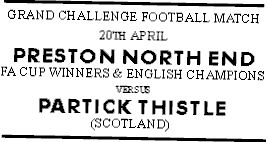 Undeterred by their poor results at the turn of the year in England, Partick Thistle organised a trip to Preston, to play the English League Champions and Cup holders, Preston North End. John McCorkindale played particularly well, Willie Paul was injured, and Preston scored five minutes from the end to win 2-1. It was a fine result for Partick Thistle. On the same day the Partick Thistle Swifts were in Ireland, playing and losing 5-1 to Limavady.
Undeterred by their poor results at the turn of the year in England, Partick Thistle organised a trip to Preston, to play the English League Champions and Cup holders, Preston North End. John McCorkindale played particularly well, Willie Paul was injured, and Preston scored five minutes from the end to win 2-1. It was a fine result for Partick Thistle. On the same day the Partick Thistle Swifts were in Ireland, playing and losing 5-1 to Limavady.
Thistle had been invited to take part in the Maryhill Charity Cup as the season wound down, and faced Linthouse in the first round. An exciting 4-4 draw was seen at Inchview – a result which was the first draw that a team from Govan had ever recorded against Partick Thistle. The replay ended in a 2-2 draw as Walter McFarlane broke his leg. Thistle’s insurance had run out a couple of weeks earlier (at the regular end of the season). The Charity Cup committee donated £10 to the player and Partick Thistle immediately organised fund-raising for the player’s benefit. A week or so later a second replay took place – a 4-2 win for Linthouse.
The season ended with a match against Rangers at Inchview, with Thistle finishing impressively with a 6-2 win over the old rivals, before a final game against Airdrie ended the season with a 5-2 win.
The Annual Meeting took place in Mr Boag’s Orange Hall in Rosevale Street, when several new members were elected onto the committee.
Sir Andrew MacLean – Patron
Mr A Craig-Sellar MP – Patron
Mr John N Boag – President
Mr William Stirling – Vice-president
Mr John Galt – Honorary secretary
Mr Andrew M Smith – Match secretary (address – 6 Church Street)
Mr C McQuarrie – Treasurer
Mr William Proudfoot – 1st XI captain
Mr Hugh Hill – 2nd XI captain
Committee – W.MacLean, William Robertson, C.Robertson, R.Robertson, P.Ewing, J.Suter.
You can read the stories of the players who played for Partick Thistle in this season here.
Categories
- Miscellaneous (16)
- Other clubs (15)
- Players (26)
- Thistle – early years (48)
- Thistle – general (5)
Football history links
- Ayr United archive
- Bill Shankly
- Falkirk Historian
- Gallant Pioneers – Early history of Rangers
- Glasgow Herald archive at Google
- Hibernian
- Hibernian Historical Trust
- London Hearts
- Partick Thistle history archive by StuTheJag
- Rangers History
- Scottish Football Historical Archive
- Scottish Football Museum
- Scottish Sports History
- ScottishLeague.net and forum
